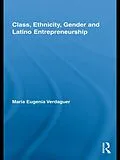Drawing on surveys and in-depth interviews, this book examines the social and economic relations of first-generation Latino entrepreneurs. Verdaguer explores social patterns between and within groups, situating immigrant entrepreneurship within concrete geographical, demographic and historical spaces. Her study not only reveals that Latinos' strategies for access to business ownership and for business development are cut across class, ethnic and gender lines, but also that immigrants' options, practices, and social spaces remain largely shaped by patriarchal gender relations within the immigrant family, community and economy. This book is a necessary addition to the literature on immigration, class, gender relations, and the intersectionality of these issues.
Autorentext
María Eugenia Verdaguer is Branch Chief for Fulbright Academic Exchanges across Latin America, the Caribbean and Canada in the Bureau of Educational and Cultural Affairs at the U.S. Department of State.
Inhalt
1. Latino Entrepreneurship Reconsidered: An Overview of the Study 2. Theorizing Immigrant Entrepreneurship 3. Divergent Latino Immigrant Stories: Salvadorans and Peruvians in America 4. The Washington Area Opportunity Structure and Latino Entrepreneurs 5. Class Resources, Group Cohesion and Business Strategies 6. Ethnicity and Business Strategies 7. Gender and Resource Mobilization Strategies 8. Social Networks, Social Capital and Embeddedness 9. Conclusion: The Social Bases and Consequences of Latino Entrepreneurship. Appendix A: Research Instruments. Appendix B: Study Participants Data.
